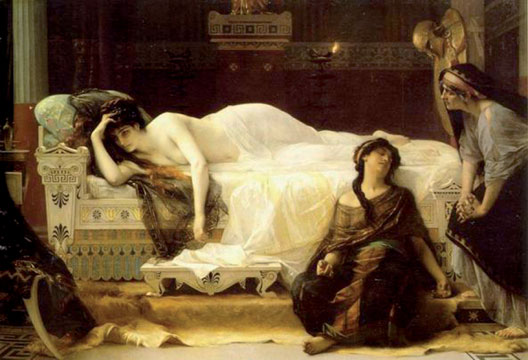|
17th century French Literature:
Jean-Baptiste Racine
 Jean-Baptiste Racine who was a contemporary of Moliere and Pierre
Corneille (last week's column) was one of the premier authors of French
dramatic tragedy during the reign of Louis XIV. His more renowned plays,
all of them written in verse, include Bajazet(1672), Mithridate (1673;
Mithridates), Iphigénie (1674; Iphigenia), and Phèdre (1677; Phaedra),
tragedies which rework themes from classical Greek models. As in Greek
tragedy and Corneille's works, Racine's plays emphasise the exposition
of character and spiritual conflict, eliminating nearly everything not
central to each drama's theme. Jean-Baptiste Racine who was a contemporary of Moliere and Pierre
Corneille (last week's column) was one of the premier authors of French
dramatic tragedy during the reign of Louis XIV. His more renowned plays,
all of them written in verse, include Bajazet(1672), Mithridate (1673;
Mithridates), Iphigénie (1674; Iphigenia), and Phèdre (1677; Phaedra),
tragedies which rework themes from classical Greek models. As in Greek
tragedy and Corneille's works, Racine's plays emphasise the exposition
of character and spiritual conflict, eliminating nearly everything not
central to each drama's theme.
Racine was orphaned as an infant and raised by his paternal
grandparents. His education afforded him a wide knowledge of Greek and
Latin literature as well as Jansenist doctrine. (The Jansenists, named
after Bishop Cornelius Jansen of Ypres, were a sect within the Roman
Catholic Church which emphasised the complete perversity of the natural
human will and the belief that sin and salvation is overcome only in the
lives of individuals predestined by divine grace.
|

Phaedra |
The influence of Jansenist teaching, which stressed human depravity
and predestined salvation, is evident in Racine's dramatic characters,
who-like their forerunners in classical Greek drama-are undone by their
passions, driven to ruin by ungovernable impulses.
The simple neoclassical tragic form was well fitted to Racine's
themes and poetic style, which has been praised for its simplicity,
harmony, and rhythmic flow; of all his contemporaries, Racine was the
first to achieve success within a framework which had been deemed too
difficult to master since its inception during the Italian Renaissance.
His style has been described as simple yet polished, smooth yet
natural.In most of his plays, Racine employed a basic plot structure in
which a monarch demands something of a particular underling, often a
prince or princess, who denies this demand.
The monarch then attempts to force his subject's obedience, with
tragic results. Launched upon a course of impending doom, Racine's
characters know what must be done to avert disaster but are unable to
subdue their desires to take prudent action. This is readily discernible
in Phaedra, the tragedy often considered Racine's finest.
Phaedra
Act I
Theseus, king of Athens, has disappeared during one of his
expeditions. Hippolytus tells Theramenes of his intention to search for
his father. But this is not the real reason he wishes to leave Troezen,
where the court has been in residence for some time.
Neither does he desire to avoid the persecution of his stepmother,
Phaedra. His only motive is to escape the charms of Aricia, the only
survivor of the royal family who formerly ruled Athens. He is in love
with her, and his father has forbidden her to marry.
Oenone, Phaedra's nurse, announces her mistress, but Hippolytus
wishes to avoid an unpleasant meeting, and departs.
The queen's behaviour, and her conversation with Oenone, betray her
incestuous and forbidden love for Hippolytus. She wishes for death, but
the sudden
|

Racine |
announcement of Theseus' death puts a new complexion on
things. Free to indulge her passion, she gives up her suicide plan in
order to arrange an alliance with Hippolytus against Aricia, to preserve
her own son's right to the throne of Athens.
Act II
Ismene, Aricia's confidante, announces Theseus' death to the young
girl and in the same breath reveals her suspicion of Hippolytus'
romantic feelings for Aricia. Incredulously the young girl listens to a
revelation that enchants her, since she, in turn, has fallen in love
with Hippolytus.
Hippolytus soon confirms the confidante's speculation in a tender but
awkward confession. The interview is interrupted by the announcement of
Phaedra's arrival, but not before Aricia has timidly admitted her own
feelings.
Phaedra comes in with the purported intention of pleading for her
son. However, carried away by her passion, she forgets her original
purpose and reveals her secret love. Crushed by Hippolytus' horrified
reception of her declaration, she takes his sword to kill herself.
As she rushes out, Theramenes comes in with a momentous rumor:
Theseus may be alive. Hippolytus decides to investigate the rumor and to
fight against Phaedra's claim to the throne and in defense of Aricia's
rights.
Act III
Phaedra's confession has had an unexpected result. In spite of her
humiliation, her hopes have been revived and she now urges a reluctant
Oenone to plead her case with Hippolytus. However the situation changes
drastically with the news of Theseus' return. At first Phaedra,
panic-stricken, again threatens suicide, then yields to Oenone's
perfidious plan to accuse Hippolytus of attempting to seduce her. When
Theseus comes in, Phaedra departs with a cryptic hint. Hippolytus also
leaves with a lame excuse.
Act IV
At the beginning of the scene, Oenone completes the slanderous
accusation against Hippolytus introduced offstage. The credulous Theseus
is completely deceived. When Hippolytus appears, Theseus wonders
indignantly at his son's innocent appearance and greets him with
immoderate accusations, culminating in a prayer to Neptune for revenge.
Hippolytus, out of filial consideration, defends himself by pointing out
his reputation for virtue and reminding Theseus of Phaedra's ancestry,
and by confessing his love for Aricia. Theseus rejects the last argument
as a mere ploy.
|

Racine |
Meanwhile, Phaedra, stricken by remorse, goes to see Theseus to plead
for Hippolytus. But she changes her mind when Theseus unwittingly
reveals to her that she has a successful rival. She becomes hysterical
with jealously and rage. Finally, however, she repents and repudiates
Oenone, the instigator and agent of her treachery.
Act V
Still refusing to clear his name, Hippolytus decides to flee but
before leaving, arranges a rendezvous with Aricia so that they may wed.
Immediately after his departure Theseus abruptly appears. In spite of
her embarrassment, Aricia stands up to him and defends Hippolytus'
innocence with such conviction that the king's certainty is shaken. He
calls for Oenone and is even more deeply disturbed when a servant
reveals Oenone's suicide and Phaedra's irrational behavior.
Theseus, at last, is willing to reconsider his belief in his son's
guilt, but it is too late. Theramenes comes in with the harrowing tale
of Hippolytus' death. Phaedra arrives and clears Hippolytus, then dies
of the effects of a poison she has taken earlier. Grief-stricken,
Theseus vows to make full amends to his son's memory and to treat Aricia
as his daughter.
Phaedra is one of Racine's most compelling creations, perhaps because
she so successfully evokes the double feeling of pity and horror.
Horrifying she undoubtedly is, for she perpetrates her crime with the
full lucidity of most classical characters. If circumstances of her
confidante's insidious advice occasionally facilitate her
transgressions, they do not ultimately mitigate her guilt. Her final
plot against Hippolytus is planned in full awareness and constitutes
premeditated murder. Phaedra does not inspire the kind of abhorrence
that her act would suggest. She is fundamentally a virtuous person
resisting desperately the pull of the abyss. There are intimations of
overpowering forces - fate, the gods, a tainted heredity, the absence of
grace - all of which seem to make her more a victim than a sinner.
Furthermore, her uncompromising assumption of guilt purifies her in the
eyes of the audience. Thus Racine follows his prescription of making
Phaedra neither entirely good nor entirely evil and keeping her within
human bounds.
He does not, for all that, neglect the tragic distance. Phaedra's
mythological background, the enormity of her crime, the implicit
presence of the gods, surround her with a dreadful grandeur, a grandeur,
however, that does not destroy her humanity.
Hippolytus
Dramatic necessity dictates that in spite of the extraordinary
intensity of her emotions, Phaedra does not dominate the stage entirely.
If Hippolytus were only a shadowy figure, Phaedra's love would be
incomprehensible, and the tragic dimensions of a great passion would be
reduced to mere wantonness. Hence Racine made of Hippolytus a
distinctive and memorable character. He is not the elemental creature
that his origins would suggest. As Phaedra specifically indicates, he
compares favorably with his father. To Theseus' physical qualities, he
adds a nobility of spirit made up of magnanimity, tenderness, and
compassion, His refusal to defend himself endows him with the aura of
martyrdom. As he says of himself (Act IV, Scene 2), "The day is not
purer than the depths of my heart."Hippolytus also belies his origins in
a peculiarly Racinian way. He is not the legendary worshiper of Diana,
whose dislike of women drew Venus' wrath. He falls in love, chastely no
doubt, but passionately. We remember him as the doomed hero of a
romantic idyll.
Aricia
While Racine lacks Shakespeare's universal curiosity and limits
himself to a few recurrent themes, he achieves a great deal of variety
within his narrow range. Thus while Aricia and Phaedra are, on the
surface, parallel characters, two women in love with the same man, they
are really antithetical. Together, they incarnate Racine's leitmotif of
night and day. Phaedra exudes darkness while Aricia is a luminous
creation. Her love is pure, chaste, and selfless. She has the innocence
and reticence of the virgin. Unlike Phaedra, who flaunts herself before
Hippolytus, Aricia waits shyly for the traditional proposal and makes
her own declaration demurely. Love degrades Phaedra, but it elevates
Aricia and gives her a special radiance.
Oenone
Unlike the generally self-effacing confidantes in Racine's plays,
Oenone has extraordinary stature. She is almost a major character,
another Phaedra played in a different key. Like her mistress she is the
victim of an overwhelming passion - in her case, maternal-like love. Her
misdeeds are not the result of an evil nature but the perversion of a
virtue. She is not an Iago taking a malicious pleasure in dispensing
perfidious advice. Her schemes and treachery are motivated only by the
hysterical desire to protect her charge. Oenone, like Phaedra, loves not
wisely but too well, and like Phaedra too, expiates her crime by
suicide.
Theseus
In his appearances, limited to the latter part of the play, Theseus,
despite the ambiguity and humiliation of his situation behaves with the
dignity and nobility we would expect of an aging king. His rage is
powerful, but it reveals no shade of self-pity or petty malice, and his
resemblance to the betrayed Othello is commented upon later. His
adoption of Aricia at the end of the play demonstrates his generosity
and humility. His errors are natural ones, and his repentance is sincere
and moving.
Critical reception
Racine attained great critical and popular success during his
lifetime, and his reputation has never waned. However, some modern
critics have also faulted Racine for his conventional views on virtue
and morality, since most of his plays betray his view that humans are
irredeemably fallen creatures who are doomed to damnation unless saved
by divine grace. In the frequent comparisons of Racine to Shakespeare,
it is pointed out that he is inferior to the English writer in the
narrowness of his range, abstention from speculation, and reluctance to
depict the complexity of human life. However, most assessments of Racine
have been positive, focusing on his psychological genius, his ability to
powerfully depict a world of violent and passionate emotions, and his
delicate and precise use of language. Racine is also considered a writer
who observed the neo-classical dramatic unities of time, space, and
action with the greatest ease and success.
His plays take an emotional situation at the very moment it is about
to explode and then focus narrowly and precisely on a single theme or
several interconnected ones, using no extraneous characters, no
gratuitous turns in the narrative, and no subplots. They use, too, a
deliberately limited, conventional vocabulary of less than 2,000 words
to produce what critics regard as extraordinary poetic effects, although
it is said that because of this that Racine's works lose a great deal in
translation. It is also generally agreed that no playwright has depicted
sexual aggression and jealousy with greater accuracy and force than he
has.
Critical commentary on Racine, concentrating on his tragedies,
continues to grow, with topics of particular interest being the
playwright's mastery of psychology, his complex views of history, his
depiction of female characters, his handling of the themes of power and
authority, and his political and Christian beliefs.
Racine's greatest strengths, scholars concur, are his firm focusing
of the plot, the concentration of his vision, his unity of aesthetic
creation, and his constant attention to the emotions immediately under
analysis.
These traits, combined with his striking use of language, produce
works that display a clarity and precision that, most commentators
agree, have never been surpassed or even equaled in French theatre. |

